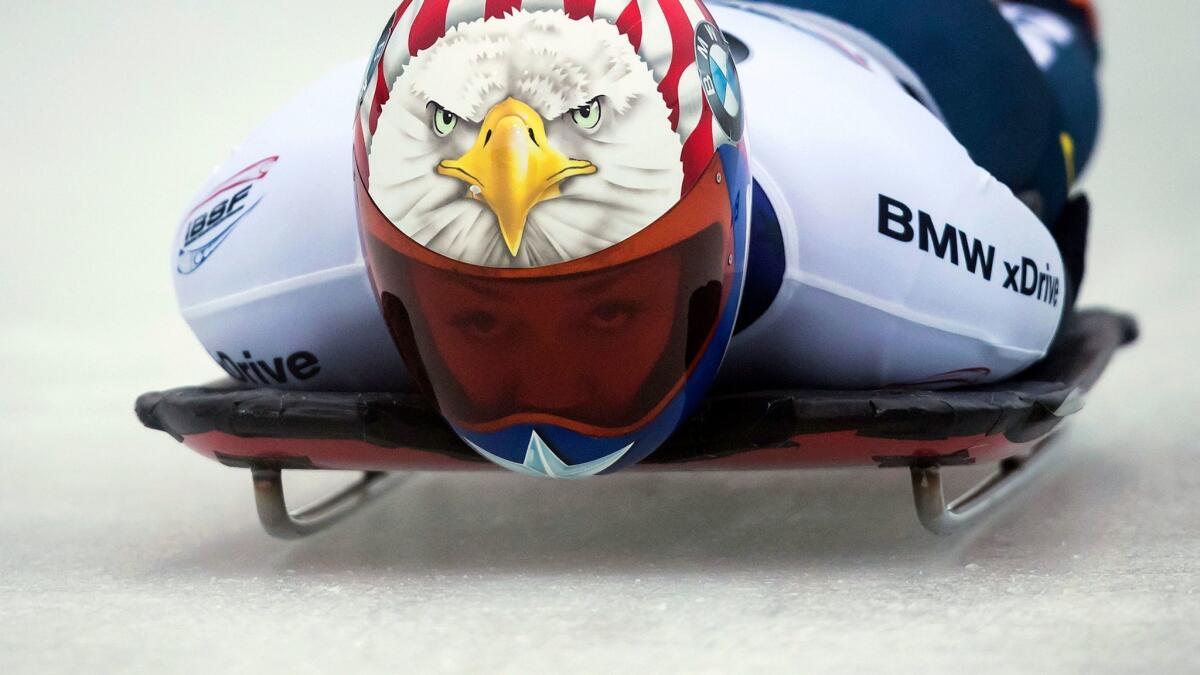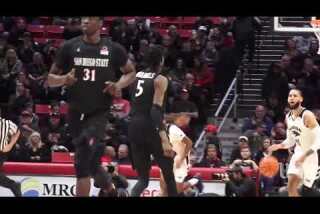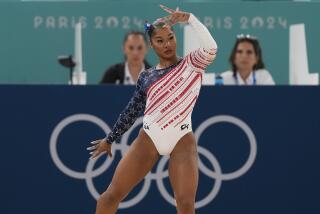Column: The American woman caught in crossfire of global sports politics

PYEONGCHANG, South Korea — It was the morning after Katie Uhlaender arrived in South Korea for the Winter Olympics, her fourth as a U.S. skeleton racer. She was tired, jet-lagged, disoriented from crossing the Pacific Ocean and the international date line.
Then she noticed a Facebook post in broken English from someone she didn’t know in Russia: Better watch your back when coming home from training you whore.
Then another: You make my heart puke.
Then another: Dumb bitch from scum country.
Then another: Your medal is wood.
Another from an unknown sender linked to an article on a Russian website. She wrote back that, sorry, she doesn’t read Russian. The reply: Your place is fourth.
Uhlaender’s heart sank. She wasn’t dreaming, wasn’t in some sort of woozy, hallucinatory state. She knew exactly what had happened. The bronze medal — her bronze medal — was gone.
“A huge gut punch,” she says.
The Court of Arbitration for Sport had overturned the International Olympic Committee’s November decision to issue lifetime bans to 28 Russian athletes linked to the heinous Sochi doping scandal and erase their results from the 2014 Winter Games. Uhlaender had finished fourth in Sochi behind Russia’s Elena Nikitina — by four-hundredths of a second after four runs — and was elevated to third when Nikitina was banned.
For 70 days.
The CAS decision last week reinstated the Sochi results, returning Nikitina to third. The woman who overcame 12 surgeries, the death of her father, the death of her best friend and her own near death in pursuit of five-ring salvation was back in fourth by four-hundredths of a second.
The pebble crushed by the wheels of bureaucracy, the collateral damage from a turf war at the highest levels of international sport, the innocent bystander gunned down in the crossfire.
The person who got screwed while the suits adjourn their meetings and head to their 5-star hotels for the night.
“When the IOC took such a strong stance to ban Russia and suspend the federation completely and strip the medals,” Uhlaender says, “it gave hope to the athletes who were holding onto the spirit of sport. And when CAS took that away, it did the opposite.
“We’re holding onto an Olympic spirit that feels like it’s dying.”
The ultimate crime, of course, is that few people embody that spirit of perseverance and courage more than Uhlaender.
She has been racing in the anonymous sport of skeleton, a one-person sled you ride head first down a sleep, icy, curving track, since 2003 and finished a promising sixth place in the 2006 Winter Games in Torino. Then she shattered her kneecap in a snowmobile accident that required four surgeries.
Then her father, former Major League Baseball outfielder Ted Uhlaender, died of a heart attack while Katie was competing in a World Cup event. She wears his National League Championship Series ring from the 1972 Cincinnati Reds around her neck on a chain, flipping it behind her and tucking it into her suit when she races so he’ll ride with her.
There would be eight more surgeries, on her left foot, her left ankle, her right knee, her left hip, her stomach, her liver. In 2016, an auto-immune disease nearly killed her. Last May, she hadn’t heard from best friend and gold medal bobsledder Steve Holcomb. She went to his room at the Olympic Training Center in Lake Placid, N.Y., and discovered his body. An autopsy found sleeping pills and alcohol in his system, a possible suicide.
Though it all, she continued chasing her Olympic dream, even flirting with weightlifting and track cycling in a bid to compete in the Summer Games as well. She was 11th in 2010 in Vancouver, then an agonizing fourth in Sochi by roughly the time it takes for a car’s air bag to deploy.
Soon reports began to surface about a nefarious scheme by the Russians, pumping athletes with a powerful cocktail of detectable, banned substances but drilling a hole in the Olympic doping lab and swapping out dirty for clean urine before the tests could be conducted.
The director of the lab ultimately defected to the United States and came clean about being dirty, providing names, dates, substances, details. A whistleblower leaked an electronic database from the Russian lab that corroborated his allegations. Two exhaustive investigative reports from the World Anti-Doping Agency found overwhelming evidence of state-sponsored, systemic doping, as did separate IOC commissions.
By November, Uhlaender had a “3” next to her name in the Sochi results and there was talk of reallocation medal ceremonies for effected athletes — during the Pyeongchang Games, or maybe a private ceremony in their hometowns, or perhaps with the IOC president at the Olympic Museum in Lausanne, Switzerland.
“I was assured by multiple people that it was a done deal, that it was real,” Uhlaender says. “People were like, ‘Congratulations, you’re a bronze medalist.’ I was like: ‘Wait, am I?’ Because I didn’t have it. I was trying to focus on the fact that it was great step in a bigger sense for the entire Olympic movement. I can’t tell you the weight it lifted from all of our shoulders, to know they weren’t going to get away with a state-wide doping system.
“I don’t think anyone saw this CAS decision coming.”
Your medal is wood. Your place is fourth.
She has tried to block it out, tried to focus on what, at age 33, could be her last Olympics, tried to stay in the moment, tried to soothe her anger by reading scripture.
It’s hard. “I’m a human being,” Uhlaender says. “I have emotions.”
This has been a tough season, ranked outside the world top 10 and complicated by a pulled hamstring that is only just now healing. By her count, she hit the wall nine times on her first practice run down the 1,376-meter Pyeongchang track.
But she’ll keep telling herself what Baron Pierre de Coubertin, the founder of the modern Olympics, said a century ago, that “the most important thing in the Olympic Games is not winning but taking part; the essential thing in life is not conquering but fighting well.” And she’ll try not to think about the glistening bronze medal, the tangible representation of a lifetime of sacrifice and courage, that was hers until suddenly it wasn’t.
Uhlaender never received the medal, never had it hang from her neck, never felt its weight in her fingers. But she’s seen it, numerous times.
Social media trolls have sent her pictures of Nikitina wearing it.
Aztecs


Video: Aztecs make history with upset over No. 6 Nevada

Aztecs prepare for Fresno State

Aztecs beat New Mexico, 97-77

Dutcher, Aztecs prepare for Air Force

Aztecs beat Wyoming, 84-54

Aztecs prepare for conference game against Boise

Aztecs beat Texas Southern, 103-64

Rocky Long: "This team has overachieved"

SDSU West bests SoccerCity as voters embrace a new vision for Mission Valley stadium site

Aztecs win season opener, 76-60
[email protected]; Twitter: @sdutzeigler
More to Read
Go beyond the scoreboard
Get the latest on L.A.'s teams in the daily Sports Report newsletter.
You may occasionally receive promotional content from the Los Angeles Times.










